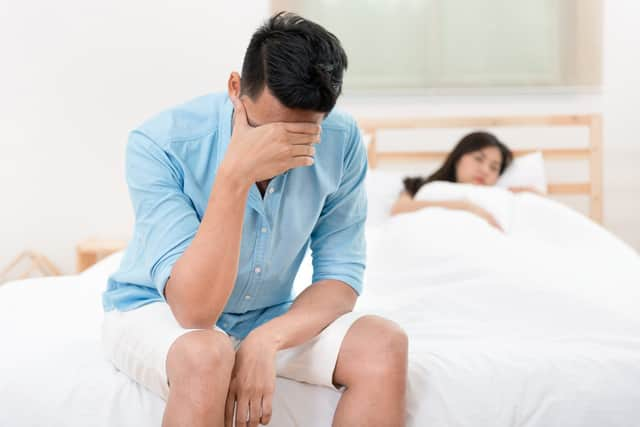In the run up to Valentine's Day erectile dysfunction is a big issue for many men


Tackling the issue of erectile dysfunction


Most men are likely to experience erectile dysfunction (ED) at some point in their lives, but a staggering91 per cent of males across the UK, have revealed they have felt a sense of shame when they’ve struggled to get or maintain an erection, according to new research.
In the run up to Valentine’s Day on Monday 14 February, where pressure to perform under the covers may reach its peak, an advice guide about erectile dysfunction has been produced by Well to help people understand the causes, symptoms and treatment options as well as offering generalguidance and support on dealing with erectile dysfunction.
Study found:
Advertisement
Hide AdAdvertisement
Hide AdThe research also found that two thirds (66 per cent) of all men have never spoken to their partner about the issue, with 82 per cent admitting they have never openly discussed it with friends or family.
Expectations and pressure and fear of being judged could be one of the main reasons preventing them from seeking help or talking about erectile dysfunction to their friends, partner or loved ones.


More than 62 per cent surveyed said it was the jokey narrative around ‘keeping it up’ which could prevent them, or others from seeking help.
Research
Along with the above stats, the poll also found:
43 per cent of males said that erectile dysfunction or performanceanxiety stopped them forging new relationships.
Advertisement
Hide AdAdvertisement
Hide Ad55 per cent of men admitted feeling inadequate when it comesto their sexual performance.
54 per cent feel too embarrassed to speak to a doctor abouterectile dysfunction.
76 per centwould go online for medical advice instead of a doctor.
What does it mean?
What is erectile dysfunction?
Erectile dysfunction (ED) is when someone regularly cannot get or keep an erection.
Advertisement
Hide AdAdvertisement
Hide AdIt may only happen in some situations and is a common condition, but for many people, they feel embarrassed and judged and this can prevent them seeking the treatment they need.
Erectile dysfunction can have physical and/or psychological causes including:
Age – Although erectile dysfunction can happen at any age, it does tend to become more common over 40.
Poor lifestyle and diet – tiredness, alcohol, recreational drug use, poor diet, inactive lifestyle, stress and smoking can all have an impact.
Advertisement
Hide AdAdvertisement
Hide AdHealth conditions such as some cancer treatments, diabetes, heart problems and other health conditions such as multiple sclerosis (MS) or having a high blood pressure can all play a part.
Psychological causes such as anxiety, stress and depression, as well as ‘performance anxiety’; and
Problems in your relationship or trying to push yourself into having sexual feelings for someone who you may not feel is right for you.
What to do if you’re worried about erectile dysfunction this Valentine’s Day:
Advertisement
Hide AdAdvertisement
Hide AdTalking to your partner can feel overwhelming, but communication is key.
Working through it together can make finding an outcome easier and could even bring you closer. Also, you should know that you’re not alone, and over half (55 per cent) of all men admit to feeling inadequate when it comes to their sexual performance.
There are many common treatment options for erectile dysfunction to explore including:
1.Medical treatments -The most common type of medication for erectile dysfunction isViagra or sildenafil.However other medicines are available, and dosage requirements vary, so it’s important to receive expert advice before using these, as well as many other treatments including a vacuum pump, injections, pellets and cream.
Advertisement
Hide AdAdvertisement
Hide Ad2.Natural remedies, including making positive lifestyle changes, therapy, particularly cognitive behavioural therapy (CBT), Herbal remedies and food supplements
Remember:Always speak to your GP or a pharmacist before trying a new remedy to ensure it is safe for you to use.